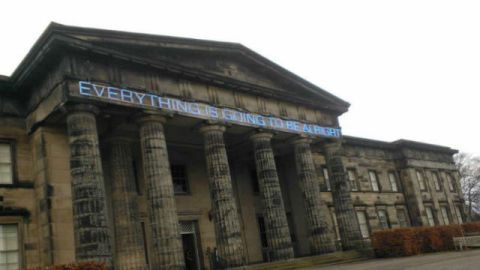Stop Asking Whether Things Are “OK”.

Pictured: A modern art museum in Edinburgh.
Disclaimer: This post contains language that some people think is offensive.
In the context of social acceptability, the use of the word “okay” smuggles a pretty terrifying idea into our vernacular. Let me explain:
In the late 19th century, a nutjob named Thomas Bowdler released an edition of Shakespeare’s works which was intended to be “appropriate” for consumption by women (!) and young people. It changed the texts to omit foul language, suicides, and prostitutes. Why even read Shakespeare without those?
Out of this history springs the word “bowdlerization” or moralizing censorship. I’m afraid it’s still going on, and its intended target has progressed from the works of Shakespeare to our everyday conversations.
Take a recent Slate article, which asks “Are The Rape Jokes in This Is The End OK?”. Or an Atlantic piece, which generously assures us that “It’s Okay to Call a Guy Creepy”. Or a flowchart which advises us when it’s ok to say “gay”. Or a New York Times article, which asks “Is It O.K. to Joke About Occupy Now?” (Apparently not). Oh, and for a grand finale, consider that there is an entire website called oktosaychristmas.com.
I could go on.
Look, I get that a lot of the people who complain about political correctness aren’t really upset about cultural standards of appropriateness for speech. They are upset that people don’t agree with the shitty things that they think. But buried in their rationalizations and quest for perceived victimization is a perfectly valid question: Quo warranto? By what warrant does anybody get to decide what is and is not “OK”?
The terrifying idea that is smuggled into our vernacular by “okay”? That every college educated, kindhearted liberal (I really do not mean that description sarcastically; I think that this is ultimately motivated by a good impulse) has a strong answer to the quo warranto question.
Now, I personally agree that people should minimize the use of the word “retarded”. And there are plenty of instances in which I would condemn (and have condemned) somebody’s entire character for the use of the word “nigger”.
Those judgments, though are an extension of my beliefs: One shouldn’t cause unnecessary suffering to others. Racism is simply a demonstrably factually wrong way to look at the world. And I stress that I am not opposed to discussing whether we should or should not say certain things. Mine is not an interest in bowdlerization. That isn’t my point here.
It also isn’t even my point that the conclusions of any of those articles are wrong.
My point is that by raising and adjudicating issues like this, the writers of the articles linked above are positioning themselves primarily as censors. High-minded censors perhaps, but censors nonetheless. If you need an example, I think that the article about the rape jokes in This Is The End is the most egregious in this respect.
When did the job of the liberal become that of the censor? Isn’t there something perverse about that? Part of the reason I am so animated about this is that I am quite sure the the opinions of the general “liberal” are our only chance at a society that is informed, empathetic, open, and free. So what does taking up the mantle of this censor job mean for my general liberal?
On one hand, it seems like a job which claims a bit too much moral authority, and tries to speak for too much of the general public. On the other, it seems rather menial. The people in the role of deciding what is and is not “okay” used to be the people who were fighting for civil rights and against wars and corruption. They used to tear down taboos, not enforce them.
Even as the writer of this pedantic, over-excited-by-words column, The Proverbial Skeptic, I am forced to question if words are really that important.
In one of his best bits, Louis C.K. repeatedly uses the phrase, “Cunt nigger faggot”. The bit plays because C.K. is such a master of exuding shame and self-deprecation. The joke, the point, is that while it is shameful to use these words, and downright wicked in certain contexts, everything is the same after he says them. He breaks the taboo, and everything is, well… Okay.




